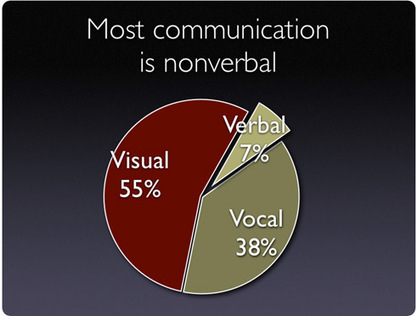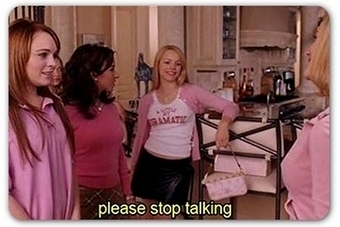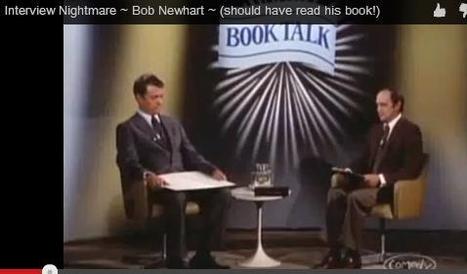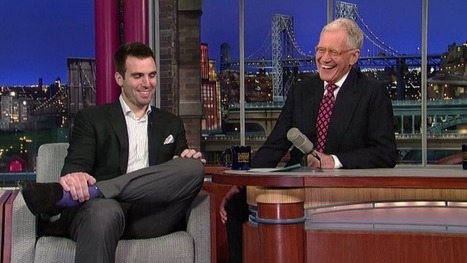 Your new post is loading...
 Your new post is loading...
When I worked for CNN, I occasionally interviewed “real people” about a topic in the news. You should be deeply skeptical of those types of interviews.
...That’s an inherent problem with the M.O.S. Time and space restrictions prevent every comment from being aired or printed, so they have to be condensed. Some journalists are better than others about disclosing the overall sentiment of opinions they encountered—and even if they do, that sentiment doesn’t mean much, since M.O.S. interviews only represent a specific place and time (M.O.S. interviews shot on Wall Street would likely yield different results than ones shot at a homeless shelter)...
A reader is being described by the media as an "opponent" of a new middle school. The truth isn't quite that black and white. How can she get the media to describe her correctly?
Here are 21 links to what I believe are the most important media training tips you need to know to be an effective media spokesperson.
When most people think of ambush interviews, they think of a television interviewer chasing after a scandal-tarred executive with camera and microphone in tow.
Those types of ambushes do occur occasionally, but they’re rare. More typically, an ambush occurs in one of two ways: - When a reporter shows up without notice.
- When a reporter deviates from the agreed-upon topic to blindside a source with something totally unexpected.
In both cases, the reporter is after one thing: a great visual that makes you look guilty. If you respond with defensiveness, anger, or shock, the news outlet will run the tape of your bad reaction repeatedly, perhaps for days. You win an ambush by denying the reporter a great visual. If you’re ever ambushed, remember the advice offered in that old deodorant ad: never let ‘em see you sweat. By remaining calm, you prevent reporters from getting the compelling “money shot” they desire.
From corporations to one-person shops, almost any business benefits from media publicity. Whether the story is pitched with the Vocus PR suite or with HARO, we see the incredible results of successful media pitching every day.
Winning that major piece of coverage all hangs on your pitch: a phone call, email, tweet, mailer, or some combination of all four, that convinces a journalist to share your story with the world. You could play it straight or get creative with a personal video as, in these essential pitching tips.
We’ve put together a list of 103 pitching tips – probably our biggest list ever – starting with tips from yesterday’s UnPitching webinar with Scott Stratten that will help you persuade a reporter to share your next piece of news....
You've probably heard the statistic that words only account for 7% of how the audience perceives you. The problem? It's completely wrong.In dozens of books and hundreds of articles, you’ll find media trainers, presentation coaches, and communications experts offering a startling statistic: Only 7 percent of the way someone forms an impression of you comes from your words! The remaining portion comes from your voice (38 percent) and your body language (55 percent)!
There’s only one problem: Those statistics are wrong. Completely wrong....
The owners of the new pizza place in my neighborhood could use a little media training. I say this a bit tongue in cheek… After all, they’re a brand new small business and will likely have little to no interaction with the media. However, their messaging and communications skills could certainly benefit from some help. So please allow me, pizza place around the corner, to give you and our readers a few pointers gratis. Here's why....
Many journalists are willing to share the basics about the stories they’re working on, and any insight they offer will help you better prepare. I mentioned that you shouldn’t conduct an interview the moment reporters call. Instead, I advised that you should offer to return their calls promptly, and for you to take at least a few minutes to prepare for the interview before you speak. But before you hang up from that initial phone call, take a few minutes to “interview” the reporter. Many journalists are willing to share the basics about the stories they’re working on, and any insight they offer will help you better prepare....
... For example, The Wall Street Journal doesn’t want the same thing from you as People Magazine. Whereas The Journal might just need a quick quote from a financial analyst to plug into a short article, People might be looking to write a three-page profile of an ordinary person who overcame tremendous obstacles to achieve a remarkable feat. So what do the media want from you? It depends on the news organization, the reporter, the story, and the format. But as different as news organizations and reporters are from one another, almost all of them want the same six things from the media spokespersons they interview...
CEO gaffes never cease to amaze and recently former Groupon CEO Andrew Mason had us scratching our heads when he compared his leadership to Battletoads.... At GroundFloor Media, we recommend that executive clients focus on knowing a few topics really well outside of their core day-to-day business, rather than trying to be an expert on everything. Doing so, positions c-level leaders as the real experts in key topic areas and provides guideposts for public comment. The media and other industry stakeholders will come to know these leaders as a go-to resource on specific issues and won’t necessarily expect them to stray from that expertise. Creating this framework and designated expertise is foundational to any executive visibility and reputation management program. For executives such as Groupon’s Mason, who may be over eager to discuss any topic that comes his way, it provides a framework to reign in their comments and stay on topic. And for executives at the other end of the continuum who might be hesitant to make themselves available to the media or public, it provides a platform for them to shine, limiting the risk of uncomfortable topics or difficult questions....
Are reporters missing the story you’re trying to tell? Are they ignoring you altogether? Maybe you’re suffering from a common disorder in PR.... Sure, providing reporters with the information they need in order to file a story is an important part of your job as a spokesperson. But the more detail you provide, the more likely a secondary or tertiary point will make its way into the story instead of a primary one. Put another way, a media interview isn’t about downloading your knowledge—it’s about prioritizing your knowledge. As we tell our clients, the more you say, the more you stray. I’ll be even a bit more provocative here: Your main task as a spokesperson isn’t to give the reporter facts. If you merely spout facts, you’ll be no more valuable than a Wikipedia entry. Your job is to give those facts context and meaning....
Appearing on television can be an odd experience. In one of the stranger (but more common) formats, you may be escorted to a closet-size booth, in which you will speak into a camera operated by a technician hundreds of miles away. This lesson will help strip away some of the mystery by arming you with 10 logistical and technical details you’ll need to know....
I've rarely seen someone tell their interviewer that I'm not your monkey. But it seems like filmmaker Quentin Tarantino was very tired of answering this question. Filmmaker Quentin Tarantino has been making violent (but well-received) movies for the past two decades. His latest effort, Django Unchained, is the latest in a long line of bloody films. But unlike other Tarantino movies, Django was released less than two weeks after the tragic school shooting in Newtown, Connecticut, which spurred a new national conversation about the role of violence in our culture. Given that context, it’s unsurprising that reporters would ask Tarantino about the extreme violence in his films. But it’s clear from Tarantino’s answers in this interview with Krishnan Guru-Murthy of Britain’s Channel 4 News that he was tired of answering the question. (The exchange begins at 2:40.)...
|
The seven-second stray can be deadly. It can damage your reputation and drown out everything else you’ve said.
... Years later, I developed a name to describe that phenomenon: “the seven-second stray.” I call it that because if a spokesperson is on message for 59 minutes 53 seconds of an hour-long interview but says something off message for just seven seconds, I can virtually guarantee that the reporter will select that seven-second answer to play over and over again.
The seven-second stray can be deadly. Not only is it often damaging to your reputation, but it drowns out everything else you’ve said, becoming the only quote the audience will remember from your interview....
If a reporter asks an unfair question, you should push back against the premise. But did you know there are times you must reject friendly questions?... While most “incorrect premise” questions are negative in tone, some are overly charitable. And if you bite on the reporter’s overly charitable bait, your response can make you appear self-indulgent, self-pitying, or both.
For example, let’s say your company made a product—a poorly designed auto part—that is likely responsible for four deaths. The reporter might ask the company’s CEO, Bob Miller, this question: “You make more than ten million auto parts each year, and only four have been linked to deaths. Do you ever feel that it’s a bit unfair for your company to be viewed as irresponsible when you have such an impressive safety record?
”BE CAREFUL!
Bob Newhart is one of my favorite comedians, so I was excited to come across this clip from his old show Newhart, on which he played a local television host and innkeeper.
In this clip from 1984, Newhart’s character, Dick Loudon, interviews retired Air Force Colonel Lloyd Menenger about his book, Up The Amazon. The problem? He didn’t read his guest’s book prior to the interview.
FishBowl DC has a post out today showing (in a huge surprise to absolutely no one) that even respected national reporters can't agree on what "off-the-record" means.
Toby Harden, the bureau chief of London's Sunday Times, opines that he could "use the information but not attribute it to anyone by name or affiliation or quote it directly." (To many people -- that would be known as "deep background" not off-the-record.)
Susan Page, the Washington Bureau Chief, USA Today, comes closer to the appropriate definition (in our view) saying to her: "...'off the record’ means you can’t use the information in a story and you can’t use the information in reporting...
When this book author went on the Fox News Channel, he encountered a biased anchor. He handled it so well, his book soared to #1 on Amazon's bestseller list.
I’ve seen a lot of biased, ill-informed, and journalistically lazy interviews through the years, and this one was one of the worst. But the author who was the target of the anchor’s ire stood up to her questions well—and, in part due to his deft handling of that interview, currently has Amazon’s top-selling book.
Writer Reza Aslan—a prolific author who holds a Ph.D. in the sociology of religion—appeared on the Fox News Channel to discuss his new book, Zealot: The Life and Times of Jesus of Nazareth. Fox News anchor Lauren Green went into the interview clearly skeptical of the book—less for its content, about which she was clearly unfamiliar—but because Aslan is Muslim. And a Muslim writing about Jesus was just too much for her to take....
It’s easy to find an example of a spokesperson getting a press conference all wrong. It’s less common—and worth noting—when someone gets it exactly right....One such example occurred after Saturday’s plane crash in San Francisco. Deborah Hersman, the head of the National Transportation Safety Board (NTSB), faced cameras shortly after the accident to discuss how her agency would handle its investigation.
During the first half of her short briefing, Ms. Hersman delivered the information reporters needed to file their stories; during the second half, she took three questions.Watch this video. It offers spokespersons everywhere a wonderful example of the right way to run a press conference during a crisis....
Some radio stations don't want to conduct interviews by telephone anymore. Instead, they may ask you to record it yourself using your smartphone.
During my first reporting shift at CNN in 1999, I was invited into a “question” meeting with Wolf Blitzer and his executive producer.
The three of us sat around for 15 minutes, coming up with questions for former Vice President Dan Quayle, who was mounting a bid for the 2000 GOP nomination.
We developed a seemingly impressive list of questions, but I noticed that the questions all fit inside certain categories. For instance, some questions were intended to be “stumpers,” while others called for speculation.
That taught me an important lesson. Spokespersons don’t need to prepare for every possible question. They just need to prepare for every type of question. Below, you’ll find six types of questions reporters always seem to ask—and how to answer them with ease....
When Should PR Pros ‘Tell Journalists How to Do Their Jobs?’ Doh...bad PR... Well here’s a highly fraught debate: to what degree should PR pros manage the message in content created by the journalists they pitch? When does “making helpful suggestions” turn into “telling journalists how to do their jobs?” This week journalist Jim Romenesko (who everyone in media should follow on Twitter and Facebook) brings us a couple of cases in which he and some of his colleagues believe that PR pros went too far. In the first instance, a reader who is also a newspaper editor received an unusually bold pitch from a man who claims to transcend the traditional role of the flack...
Gone are the days of the hidden, tiny text box where a publication admits it made a reporting error. In today’s digital media age, you no longer have to wait days or weeks to rectify incorrect or inflammatory comments made about your client. You can now ask outlets for updates to be made online almost immediately. But the question remains: Does the value of correcting what you and your client see as inaccurate outweigh the risk of getting sideways with a reporter who will likely cover your client again? In GroundFloor Media’s recent experiences, the answer is a resounding yes....
Let’s say you’re a hedge fund manager. You know that many people in the public—even though they don’t fully understand what hedge funds are—hate your work. Some blame you for the financial collapse of 2008. A few even regard you as immoral. So when you’re interviewed by reporters who ask you about the unpopularity of hedge funds, your inclination is to defend what you do for a living and aggressively rebut their charges. It’s a natural instinct—but it’s also a mistake....
Joe Flacco may have won the Super Bowl MVP award, but the onus is on his surrounding PR staff to make his procession of media interviews pop. ...However, his father, Steve Flacco, told The New York Times: “Joe is dull. As dull as he is portrayed in the media, he’s that dull. He is dull.” And while Flacco may have been in the Ravens' trainers' hands all season, his efforts under the white-hot lights of the media now put him in the PR department's hands.
Here are 7 tips in handling an athlete on the media circuit....
|



 Your new post is loading...
Your new post is loading...



































Useful insight into how news/ is put together and what to watch out for.